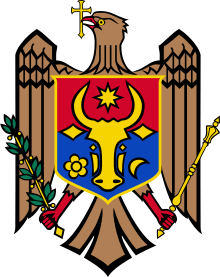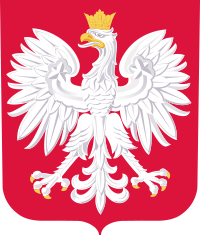Moldova–Poland relations
Moldova–Poland relations refers to the relationship between Moldova and Poland. The two countries established relations following the independence of Moldova at 1991.
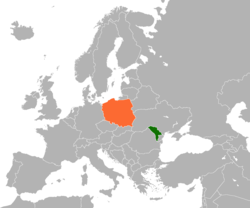 | |
Moldova |
Poland |
|---|---|
History
Historically, the Principality of Moldavia was a vassal of Kingdom of Poland and later, Polish–Lithuanian Commonwealth. Due to this, a small but active Polish community existed in Moldova. Both were later occupied by Russia and Soviet Union in various times.
Polish Community in Moldova
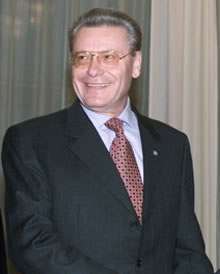
According to the 1989 Soviet Census, there were 4,739 Poles in the Moldavian SSR.[1] The Moldovan Census of 2004 reported 2,383 Poles.[2] The latter census did not include data collected in Transnistria, which for centuries was within the boundaries of the Polish-Lithuanian Commonwealth and was subject to significant Polish colonization. The 2004 Census in Transnistria reported 2% of the population (about 1,100) to be Poles.[3]
Some publications of Polonia activists and Polish diplomats mention numbers of more than 20,000 Poles in Moldova, — numbers significantly exceeding that of self-identified Poles in the census. Some authors include in their estimates people of Polish descent, while others assume people of Catholic faith (in a predominantly Eastern Orthodox country) are most probably of Polish descent; and this may include, e.g. Ukrainians with ties to Poland in their ancestry.
As a consequence of the Russian and Soviet policies towards Polish culture, only a small percentage of Poles in Moldova today speak Polish.[1] For example, Petru Lucinschi (Romanian pronunciation: [ˈpetru luˈt͡ʃinski], who served as the second President of Moldova carries a transcribed version of the Polish surname Łuczyński, but has never publicly identified with a Polish heritage. A number of Transnistrian politicians such as former First Lady Nina Shtanski and Yevgeni Zubov, however, are open about their Polish roots.[4]
Modern relations
Poland has always been a vocal supporter for Moldova's integration and membership to the European Union, which Poland is a member of.[5][6] Poland has been well-aware with political marginalization of Moldova with the situation of Transnistria[7] and Poland has officially announced it won't recognize Transnistria as a separate nation.
The Warsaw Institute, a Polish think tank, maintains a Romania Monitor to explain the main course of political, economical and social developments in Romania and Moldova.
Resident diplomatic missions
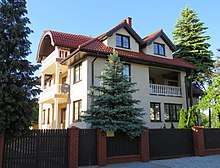 Embassy of Moldova in Warsaw
Embassy of Moldova in Warsaw Embassy of Poland in Chișinău
Embassy of Poland in Chișinău
See also
References
- "Moldova: Arena of International Influences", 2012, ISBN 0739173928, "Support of Polish Disapora"
- (in Romanian, Russian, and English) 2004 Moldovan Census results (list of all available census documents in .xls and .doc format)
- "2004 Transnistria Census info". Archived from the original on 2009-03-18. Retrieved 2013-06-25.
- Kosienkowski, Marcin (2012-10-05). "POLSKA I NADDNIESTRZE: CZAS NA WSPÓŁPRACĘ?". New Eastern Europe. Retrieved 28 May 2020.
- "POLAND TO HELP MOLDOVA ON THE WAY TO EUROPE".
- "Poland – a Faithful Supporter of the Republic of Moldova in Relations with the EU".
- "Polska a Mołdawia i Naddniestrze (Poland's Relations with Moldova and Transnistria)". SSRN 2175263. Cite journal requires
|journal=(help) (48.9 KB)
External links
- Embassy of the Republic of Moldova to the Republic of Poland
- Ministry of Foreign Affairs, Republic of Poland
